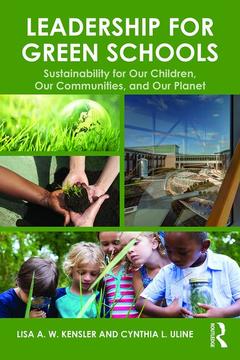Leadership for Green Schools Sustainability for Our Children, Our Communities, and Our Planet
Auteurs : Kensler Lisa A. W., Uline Cynthia

Leadership for Green Schools provides aspiring and practicing leaders with the tools they need to facilitate the design, leadership, and management of greener, more sustainable schools. Framed by theory and research, this text draws from the fields of sustainability science, built learning environment, and educational leadership to explain what green schools look like, what role school buildings play in advancing sustainable organizational and instructional practices, and why school leaders are "greening" their leadership. Sustainability can often seem like an unreachable, utopian set of goals, but this important resource uses illustrative examples of successful schools and leaders to show how establishing and managing green schools aligns with the work they are already doing to restore engaged learning within their schools and communities. Leadership for Green Schools is a unique and important resource to help leaders reduce the environmental impact of school buildings and immerse students in purposeful, meaningful learning for a sustainable, just future.
Special Features:
- Examples from award-winning schools and leaders?best-practices and illustrative examples throughout make whole school sustainability come to life and show how green leadership is a real possibility for the reader.
- Aligned with Professional Standards for Educational Leadership?provides the tools necessary for leaders to advance sustainability goals while at the same time fulfilling the core purposes of their job.
- End-of-chapter discussion questions?valuable pedagogical tools invite personal reflection and conversation.
Preface
Acknowledgements
CHAPTER 1: Introduction - Leading Schools with a Green Frame of Mind
PART I: The DNA of Whole School Sustainability
CHAPTER 2: In the Best Interests of Children
CHAPTER 3: Design Principles for Whole School Sustainability
CHAPTER 4: Greening Your School’s Vision
PART II: Healthy Ecosystems for Learning
CHAPTER 5: Place, Community, and Partnerships
CHAPTER 6: Green School Buildings as Dynamic Learning Environments
CHAPTER 7: Operations and Maintenance for Whole School Sustainability
PART III: Meaningful, Purposeful, Engaged Learning
CHAPTER 8: For the Love of Learning
CHAPTER 9: Innovative Teaching in Green Schools
CHAPTER 10: Green School Networks, Recognition Programs, and Resources Tania McKey
INDEX
Lisa A. W. Kensler is an Associate Professor of Educational Leadership at Auburn University. She received her EdD in Educational Leadership from Lehigh University in 2008 and a Master’s degree in biology from Old Dominion University in 1996. Prior to returning to her childhood stomping grounds in Pennsylvania to earn her doctorate, Lisa spent a decade serving as a secondary science teacher and teacher leader in Norfolk, VA, Annapolis, MD, and St. Louis, MO. She taught in public schools and an independent school. In all cases, she worked to create the sort of classrooms students would choose to attend, even if their attendance was not required. She empowered students to lead in the classroom and beyond. She and her students were active in Jane Goodall’s Roots & Shoots program, designing and leading initiatives for making the world a better place. Prior to her work as an educator, Lisa was an ecologist. Early in her career she worked for the Smithsonian’s National Museum of Natural History and the U.S. Fish and Wildlife Service studying coral reefs, Chesapeake Bay, and the Great Lakes.
Lisa’s research is grounded in her lifelong love of nature and her experience as an ecologist and educator. She uses her understanding of living systems to inform her research related to green schools and the leadership and learning required for transforming schools into more socially just, ecologically healthy, and economically viable communities. She has published articles and book chapters on democratic community, trust, systems thinking, and sustainability. She also integrates sustainability into the educational leadership courses that she teaches. Lisa was the 2013 winner of the Emily & Gerald Leischuck Graduate Teaching Award, an award that recognizes "faculty members who have consistently shown evidence of superior teaching excellence. These individuals have gone above and beyond the call of duty by engaging their students in the classroom and
Date de parution : 09-2016
17.8x25.4 cm
Date de parution : 09-2016
17.8x25.4 cm
Thème de Leadership for Green Schools :
Mots-clés :
Green schools; Going green; Environmental education; Sustainable leadership; Leadership for sustainability; School leadership; Whole school sustainability; Green school movement; Leading green schools; ISLLC standards; Educational leadership; Leadership practice; Principals; Leadership for Green Schools; Sustainability for Our Children; Our Communities; and Our Planet; Lisa W; Kensler; Cynthia Uline; Tania McKey; Green School Leaders; Transformative Principal Leadership; Green Walls; Uphill Climb; Sweet Peas; Virginia Beach City Public Schools; Attention Deficit Disorder; Vice Versa; Energy Star; USGBC; ISLLC Standard; Student Engagement; Winning Schools; LEED Certification; CCSS Standard; PR; Youth Participatory Action Research; Shared Vision; Effective Instructional Leadership; School Sustainability; Professional Development; Green School Buildings; IAQ Problem; Successful Principal Leadership; Children’s Environmental Attitudes



